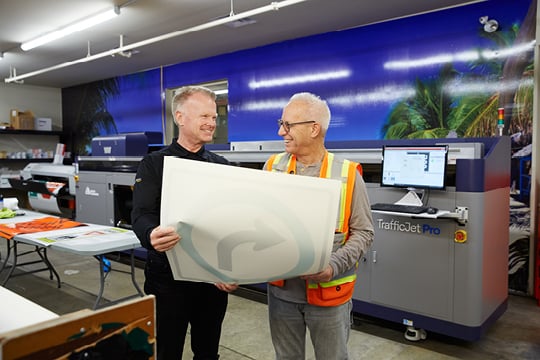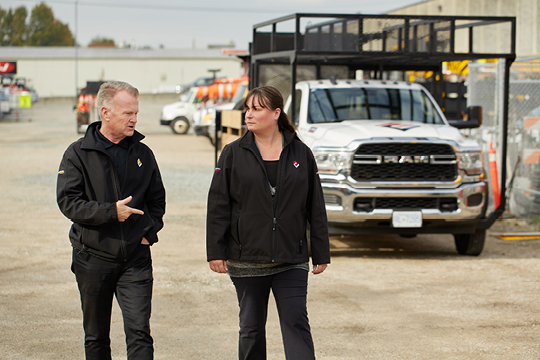No stops for this B.C. traffic control company: Acquisition strategy drives stunning growth

Universal Group is a poster boy for exponential business growth. Starting with less than 20 employees in 2011, the Langley, B.C.-based traffic-control company expanded to 400 workers by March 2020 when the pandemic struck.
It had become one of the province’s leading providers of traffic management services at road and other construction projects for contractors, utilities and municipalities. “Our growth has been off the charts,” CEO Michael Menzies says. “It’s been exciting.”
Not even COVID-19 has been able to derail the company’s spectacular trajectory. When the health crisis struck, Universal Group was about to merge with a major B.C. competitor. The company not only pulled through on executing this transaction, but also completed a second major acquisition a few months later.
Workforce grew fourfold during pandemic
Universal Group is now what Menzies calls a “one-stop shop” in the province, offering a full gamut of traffic-control planning services, personnel and equipment and even manufacturing its own custom traffic-control signs. Thanks to other acquisitions, the company now also has divisions offering landscaping, occupational health and safety training, and on-demand labour.
And in July 2021, the company made its first foray outside the province, acquiring traffic-control firms in Ottawa, Ont., and Gatineau, Que.. The business now has 1,700 employees—four times more than in March 2020. BDC Capital’s Growth Equity Partners team provided equity to help Universal Group complete these acquisitions.

Acquisitions made tech purchases feasible
Universal Group’s impressive growth reflects the findings of a new BDC study on acquisition. It found that companies with an acquisition-based growth strategy are two times more likely to have above-average sales growth than those expanding organically.
The study also found that the fastest-growing motivation for buying a company is acquisition of technology.
That was certainly a decisive factor for Menzies. Thanks to the acquisitions, the company’s larger size has made it financially feasible to pursue major technology investments that will let Universal Group scale and expand still more.
App shows dispatch instructions, digitizes time sheets
One of the company’s latest tech purchases is a sophisticated new workforce management system that will streamline and simplify the complex task of dispatching 1,700 workers to hundreds of job sites every day.
Workers will have an app on their phone to see dispatch instructions and get routes to job sites.
Michael Menzies
CEO, Universal Group
“Workers will have an app on their phone to see dispatch instructions and get routes to job sites,” Menzies says. “They’ll have safety protocols and traffic control plans at their fingertips and can easily complete and send in time sheets.”
The system is widely used in the U.S., but less so north of the border; Universal Group is the first company in the traffic control industry in Canada to adopt it.
New system reduces workload and errors
The app will also integrate with another new technology the company purchased to automate payroll management. “Workers used to need to fill out a three-part time sheet every day, which had to be manually entered,” Menzies says. “It was a lot of effort and there was lots of potential for error.”
The new payroll system will automatically receive time sheet information from the workforce management system, significantly reducing workload and mistakes.
Additional automation and efficiency are coming thanks to a new human resources information system, which will improve personnel management. “It’s much-needed because the industry has been very manually intensive,” Menzies says. “If we had had this technology earlier, we would have been able to grow that much more.”

Tech investments allow scaling
Up until the business acquisitions of the past 18 months, the steep price tag of the new systems put them out of reach. “The old business couldn’t have justified the investments,” Menzies says.
Now, on the other hand, he is confident the company has built a solid foundation and achieved economies of scale to execute on an ambitious strategy of further acquisition and organic growth.
“We’ve built a very strong back office that allows us to scale.”
Acquisitions and tech improve retention
The acquisitions and new technology also help Universal Group address a major challenge affecting the whole Canadian economy: the labour shortage. “We need to be laser-focused on retention and ensuring the employee experience is the best it can be,” Menzies says.
Work in traffic control is typically seasonal, but the expanded company offers more ability to keep employees working year-round because of the greater diversity of clients and size. “It’s better for our workers because they generally want to work through the year,” Menzies says. “This gives us an advantage when it comes to retention.”
The company’s new technology also makes the workplace more attractive because it improves productivity, reduces frustration with paperwork and shows a forward-looking company investing in best practices and its future, he says.
Universal Group’s experiences dovetail with findings from BDC’s study, which found that another key motive for business acquisitions was securing worker talent and expertise.
Stars align for strategy to scale and grow
Looking to the future, Menzies has ambitions to expand Universal Group across Canada and into the U.S. Pacific Northwest, with an eye to taking advantage of an infrastructure spending surge in both countries.
He also sees opportunity in the fact that the traffic control industry is highly fragmented, with many small mom-and-pop companies. “The industry is ripe for consolidation,” Menzies says.
“We see opportunities to raise standards and the quality of service and safety levels. Significant opportunity for growth exists if we can infuse best practices. We see the stars aligning to professionalize the industry and build a national platform across Canada and in the U.S.”